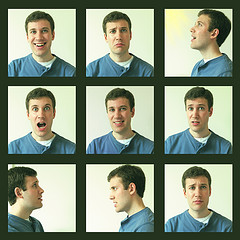 photo by Kristin Nador |
Here is part of an email I received from a reader last week:
“I had a profound experience with my first EFT session whilst just tapping along and now I'm almost scared to indulge in some more. It's as if I have large chunks of my memory missing. Am I really erasing my memories?”
This is a great question because it is a common experience. AND if we are worried that tapping will “erase” our memories it makes sense that we wouldn't want to use it.
There are two things we need to understand in order to answer this question: how memory works, and what happens to memories when using Emotional Freedom Techniques (EFT).
Your Memory Isn't Accurate
The first thing to note is that our memory is not an accurate representation of what has happened. Our memories are incomplete interpretations of the past. If you don't believe me, ask three of your family members to tell the story of what happened last year over the holidays and you will be given three different versions of events.
In addition to our memories not being a perfect representation of what happened, they also alter over time. Each time we access a memory we are not just replaying what happened, but we are also adding to it.
That is why as time goes by our past looks better and better (or worse and worse). Not only are we remembering something that happened in the past, but each time we think about this past we add positive feelings to the memory.
Many people would describe their first kiss as a magical moment. The reality may have been it was an experience shared by two 13 year olds who had no idea what they were doing, but as the moment is recalled over and over again it is slowly turned into the most magical moment ever.
The fact that tapping changes the way we remember things is not surprising because we are always changing and reforming our memories without even realizing it.
We Didn't Erase It, We Released It
Once we understand that the memory is not static we can start see what happens to our memories when we are tapping.
Our memories are not just the fact of what happened. In addition to, “she said this, he said that, and then someone walked in,” our emotion also forms part of the memory.
The memory is: She said this and felt worried. He said that and I felt overwhelmed. He walked in I felt like I had an ally.
In many cases the emotions we remember (and relive when we remember) are a large portion of the memory. When we tap on a memory we release the emotion associated with the memory.
If the memory was 70% emotion and we release all the emotion, then we are only left with 30% of the memory. When this happens it feels like the memory has been erased. It is much like if we only had 30% of the pieces of a jigsaw puzzle. The picture would be so incomplete we couldn't tell what we were looking at.
It Is Part Of The Healing Process
When you tap on a deeply emotional past memory there is a very real possibility that it might feel like you are erasing your memory. In really you are just letting go of the emotional charge that is part of the memory. This is a natural part of the healing process and it is OK. There is no need to worry.
AND when this happens you are freeing yourself up to fill the space occupied by the emotion with better and richer feelings.










 What have you found works well when tapping with kids? What mistakes have you made from which you have learned? Click here to
What have you found works well when tapping with kids? What mistakes have you made from which you have learned? Click here to 


